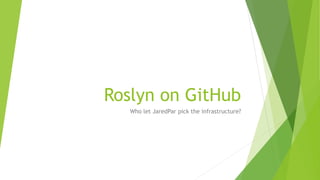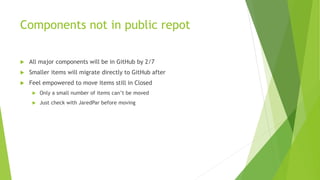Roslyn on GitHub
- 1. Roslyn on GitHub Who let JaredPar pick the infrastructure?
- 2. Overview ïĩ Git ïĩ The basics ïĩ Typical workflow ïĩ Tools ïĩ How we work ïĩ Code structure ïĩ Transition ïĩ Looking forward
- 4. What is this talk? ïĩ This is not a definitive guide to Git ïĩ Too big a topic for a 1 hour talk ïĩ This is a broad overview of Git ïĩ Explain the work flow ïĩ Introduce the basic commands ïĩ Explain the Git mindset ïĩ Git is different than TFS or SD ïĩ The mindset is the key to learning Git
- 5. Remember learning TFS? ïĩ Everyone was given a handy command map sd sync -> tf get . /r sd commit -> tf checkin sd branch -> tf branch sd undo -> tf revert ïĩ Donât learn Git this way ïĩ There is no simple command mapping
- 6. Git is different ïĩ TFS is a black box ïĩ It is backed by a SQL server ïĩ It has a ASP.Net front end ïĩ Developers unconcerned with how data is stored ïĩ Git is a very thin layer over the file system ïĩ Implementation bleeds into the presentation ïĩ Commands directly modify the local file system ïĩ Must know how Git works to use it efficiently
- 7. Storing Content ïĩ Core of Git is a content addressable file system ïĩ Key / Value storage ïĩ Value can be âĶ ïĩ Contents of a file or directory ïĩ Description of a change ïĩ Key is the checksum of the value (SHA1) ïĩ Value is immutable ïĩ If the value changes, so does the key ïĩ Everything is stored here (commits, files, directories, etc ...) ïĩ This mapping is central to the operation of git
- 8. Git used to checksums ïĩ âDo one thing wellâ Unix Philosophy ïĩ Git does one thing well âĶ checksums ïĩ Check sums are used to ïĩ Lookup file, directory contents ïĩ Sync across machines ïĩ Basically everything ïĩ SHA-1 hash is 40 characters ïĩ Typically referenced by first 6 characters ïĩ More used only in face of collisions
- 9. Demo Git Basics Itâs CMD time
- 10. Basic Commands ïĩ status: ïĩ Displays tracked files that have changed ïĩ Displays untracked (new) files ïĩ add: ïĩ Include file in the set of files to be added ïĩ Adds file to the object store ïĩ commit: ïĩ Equivalent of checking files in
- 11. Commits ïĩ Just another piece of addressable content ïĩ Contents ïĩ Reference to parent commit objects (0-N) ïĩ Reference to a tree object ïĩ Set of file names + contents SHA1 ïĩ Commit Message ïĩ Author name ïĩ Description of a change
- 12. Branches ïĩ Content ïĩ Reference (SHA-1) to a commit object ïĩ Every commit updates the reference ïĩ Thatâs it ïĩ Extremely light weight ïĩ One file one disk ïĩ Content is SHA1 of the current commit ïĩ 20 bytes per branch
- 13. What is in the Git Repo? ïĩ Content addressable storage ïĩ List of named branches ïĩ Each has a SHA1 referring to the latest commit ïĩ List of remote repos ïĩ URL of the Git repo ïĩ Set of branches in the repo
- 14. History ïĩ Repos have a set of branches ïĩ Local and remote ïĩ Complete history is available for every branch ïĩ Branch points to a commit ïĩ Every commit points to its parent (recursive) ïĩ Every commit points to its contents ïĩ This is distributed version control ïĩ My repo is as complete as any other
- 15. Working with remotes ïĩ Typical naming ïĩ upstream: dotnet/roslyn ïĩ origin: jaredpar/roslyn ïĩ fetch brings down changes from a remote repo ïĩ Updates list of branches and their commits ïĩ This in turn brings down all the changes for the new commits ïĩ fetch is always safe ïĩ Never changes the working directory ïĩ Manually merge changes later ïĩ pull = fetch + merge
- 16. Pull requests ïĩ All work occurs in personal fork ïĩ Developers never commit directly to dotnet/roslyn ïĩ Iterate in personal fork until ready for official repo ïĩ Create a Pull Request (PR) ïĩ Please merge my branch into official repo ïĩ All changes to your branch reflected immediately in PR ïĩ Developers offer feedback on the PR ïĩ Eventually change is accepted and auto-merged into official repo
- 18. The Tools A UI for Git?
- 19. GitHub For Windows ïĩ Free application created by GitHub ïĩ https://windows.github.com/ ïĩ Sets up local 2 factor authentication ïĩ Use UI or command line without dealing with tokens ïĩ Installs standard versions of git on the machine ïĩ A mysysgit installation optimized for Windows ïĩ Includes posh-git ïĩ Automatically, and frequently, updates itself
- 20. FxKit ïĩ xcopy toolkit developed by CoreFx (Nicholg) ïĩ Git environment optimized for DevDiv usage ïĩ This is not razzle ïĩ No admin requirements, no private toolset ïĩ Extending git in supported ways ïĩ Gaining traction in corefx ïĩ Not intended to be a requirement, just a tool
- 21. Other ïĩ More fully featured ïĩ TortoiseGit: https://code.google.com/p/tortoisegit/ ïĩ Bare bones installations ïĩ MySysGit: https://msysgit.github.io/ ïĩ Cygwin: https://www.cygwin.com/
- 22. Code Structure What goes where?
- 24. Code flow after the switch TFS Open Loc Closed GitHub src build One way mirror src build
- 25. Where do I work? ïĩ Majority of work is in GitHub ïĩ Holds all production code ïĩ Holds most of our tooling ïĩ All work done in personal forks of dotnet/Roslyn ïĩ Start with one branch per change ïĩ Code merged into main repot via Pull Requests
- 26. Getting a full enlistment ïĩ Use SyncGit.ps1 ïĩ New file in root of TFS repo ïĩ Will setup a Git repo inside Open ïĩ Direct clone of your fork into Open ïĩ The TFS Open directory will be cloaked ïĩ Results in same directory layout present today ïĩ Can commit to git or TFS from this setup
- 27. Cross cutting changes ïĩ Changes that affect both Open and Closed ïĩ Use a full enlistment ïĩ Must be done in Git and TFS ïĩ First get code committed to GitHub ïĩ Then get the code committed to TFS ïĩ Such changes should be rare ïĩ If common then probably need to move more to Open
- 28. How does code get shipped? ïĩ Changes from Git mirrored to TFS ïĩ Official builds still come from MicroBuild ïĩ MicroBuild process will use TFS ïĩ Gets GitHub changes from mirror ïĩ Directory structure unchanged from today ïĩ Nothing changes about MicroBuild
- 29. Components not in public repot ïĩ All major components will be in GitHub by 2/7 ïĩ Smaller items will migrate directly to GitHub after ïĩ Feel empowered to move items still in Closed ïĩ Only a small number of items canât be moved ïĩ Just check with JaredPar before moving
- 30. Looking forward ïĩ Git / TFS mix will exist for a few weeks ïĩ Give developers time to adjust ïĩ Figure out our processes ïĩ Let the Open / Closed breakdown settle ïĩ Eventually Closed moves to private GitHub repo ïĩ Possible move to binary refs between the two ïĩ TFS still exists but just for MicroBuild and PDB sources
- 32. Please have patience ïĩ This is a big change ïĩ Working to make it as smooth as possible ïĩ That doesnât make it any smaller ïĩ There will be ïĩ Hiccups ïĩ Unanticipated obstacles ïĩ A transition period ïĩ Team effort to get us through this
- 33. Resources ïĩ Pro Git Book (online): http://git-scm.com/book/en/v2 ïĩ Git SCM Blog: http://git-scm.com/blog ïĩ Git Immersion: http://gitimmersion.com/ ïĩ Just google âgit {my problem}â ïĩ More resources than time to read them
Editor's Notes
- #4: Emphasize this is an overview, not a definitive guide
- #7: Ask, does anyone here actually know how data is stored in TFS? Emphasize that every command is just making a small tweak to the file system
- #8: Note that the value is immutable simply by virtue of the address system. If the value changes then so does itâs key
- #9: Such a pun ï Git hash-object 7c31c8840d83b5d7bc8b7479331a6332df60656b I suppose it is tempting, if the only tool you have is a hammer, to treat everything as if it were a nail.
- #10: Cover cat-file hash-object commit
- #14: Mention these branches are equivalent to local branches. It is just a name that points to a commit object.
- #19: Git hash-object 7c31c8840d83b5d7bc8b7479331a6332df60656b I suppose it is tempting, if the only tool you have is a hammer, to treat everything as if it were a nail.
- #20: If you come to me with 2 factor authentication problems I will tell you to install GitHub for windows
- #21: Not a requirement by any means.
- #26: Any cross cutting change that is regularly occurring is a sign that the code isnât factored correctly
- #28: Yes this causes the pot
- #29: Need to find a way to manually kick it off
- #33: Some things we simply canât be fixed until we take the plunge

































